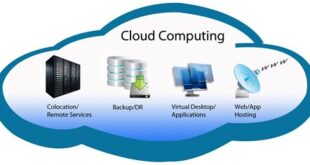
What is cloud technology?
Cloud technology, also known as cloud computing, is a revolutionary concept that has transformed the way businesses and individuals store, manage, and process their data. It involves the utilization of remote servers located on the internet to accomplish these tasks, providing a plethora of benefits and convenience for users worldwide. But what exactly does cloud technology entail and how does it work? Let’s delve deeper into this cutting-edge technology and explore its various facets.
The fundamental premise of cloud technology revolves around the concept of using remote servers instead of traditional local servers or personal computers to store and process data. These remote servers, often maintained and operated by reputable cloud service providers, offer users the ability to access their files, applications, and services from any internet-connected device and location. It eliminates the need for physical storage devices, such as external hard drives or USBs, and enables seamless collaboration and data sharing among multiple users in real-time.
One of the key advantages of cloud technology is its scalability. Traditionally, businesses had to invest in expensive hardware and software solutions to meet their growing data storage and processing requirements. This posed a significant financial burden and often resulted in underutilized resources. With cloud technology, however, organizations can easily scale their storage and processing capacity up or down depending on their needs. Whether it’s expanding storage for exponentially growing data or increasing computing power for resource-intensive operations, cloud technology offers unparalleled flexibility and cost-efficiency.
Furthermore, the cloud technology landscape comprises various service models that cater to different needs and preferences. The most commonly known and utilized models include Software as a Service (SaaS), Platform as a Service (PaaS), and Infrastructure as a Service (IaaS). SaaS provides users with ready-to-use software applications accessible via the internet, such as web-based email clients or cloud-based project management tools. PaaS offers a platform for developers to create, test, and deploy applications without having to worry about the underlying infrastructure. IaaS, on the other hand, provides users with virtualized computing resources that can be used to build and manage their own IT infrastructure.
Security and data privacy are critical concerns when it comes to cloud technology. As businesses and individuals entrust their sensitive and valuable data to remote servers, it is imperative that proper measures are in place to safeguard this information. Reputable cloud service providers leverage industry-standard security protocols, including encryption and authentication mechanisms, to ensure data integrity and protect against unauthorized access. Additionally, backup and disaster recovery systems are commonly implemented to mitigate the risks of data loss or service interruptions.
Cloud technology has revolutionized the way we store, manage, and process data. Its numerous advantages, including accessibility, scalability, and security, make it an invaluable tool for organizations and individuals alike. Whether you’re a small business looking to streamline your operations or an individual seeking seamless access to your files and applications, cloud technology provides an innovative solution that empowers users to stay connected, productive, and efficient in today’s digital age.
Looking for reliable and efficient cloud services? Our comprehensive guide will help you choose the right service provider for your specific business needs.
Benefits of cloud technology
Cloud technology, which refers to the use of remote servers to store, manage, and process data, has revolutionized the way businesses operate. It has become an integral part of the digital landscape, providing a wide range of benefits for organizations across various industries. By harnessing the power of the cloud, businesses can enhance their efficiency, productivity, and competitive edge.
One of the primary benefits of cloud technology is cost savings. Traditionally, businesses had to invest in expensive hardware, software, and IT infrastructure to manage their data. With the cloud, these costs are significantly reduced as businesses only pay for the resources they use. This pay-as-you-go model eliminates the need for upfront capital expenses and allows businesses to scale their operations without significant financial burden. As a result, cloud technology enables businesses to allocate their financial resources more effectively and invest in other areas of growth.
Scalability is another key advantage offered by cloud technology. In the past, businesses had to predict their future data storage and processing needs and invest in infrastructure accordingly. This often led to underutilization or overprovisioning of resources. With the cloud, businesses can easily scale their operations up or down based on their current needs. They can quickly add or remove resources, such as storage space or computing power, to accommodate fluctuating workloads. This flexibility allows businesses to respond rapidly to changing market demands and ensure optimal performance.
Moreover, cloud technology promotes increased collaboration among employees and teams. By providing a centralized platform for data storage and access, the cloud allows employees to work together seamlessly, regardless of their physical location. Team members can collaborate on documents, share information, and communicate in real-time, leading to improved workflow and productivity. Additionally, cloud-based collaboration tools enable businesses to streamline their project management processes and foster innovation through enhanced teamwork and knowledge sharing.
Data security is a paramount concern for businesses in today’s digital landscape. Cloud technology offers advanced security measures to protect sensitive data from unauthorized access, data breaches, and other cyber threats. Cloud service providers utilize encryption techniques, firewalls, and multi-factor authentication to ensure the confidentiality, integrity, and availability of data. Furthermore, the cloud enables businesses to automate data backups and disaster recovery procedures, minimizing the risk of data loss and ensuring business continuity. With the cloud, businesses can have peace of mind knowing that their data is securely stored and protected.
Another significant benefit of cloud technology is automatic software updates. In the traditional on-premises model, businesses need to manually update their software, which often involves downtime and disruptions to operations. With the cloud, software updates are automatically rolled out by the service provider, ensuring that businesses always have access to the latest features, enhancements, and security patches. This eliminates the need for businesses to allocate resources for software maintenance and allows them to focus on their core competencies.
In conclusion, cloud technology offers a multitude of benefits that empower businesses to thrive in the digital age. From cost savings and scalability to increased collaboration, improved data security, and automatic software updates, the cloud provides a solid foundation for growth, innovation, and competitiveness. By harnessing the power of the cloud, businesses can streamline their operations, enhance their productivity, and unlock new opportunities for success.
In this article, we will discuss the benefits and features of cloud technology. Cloud technology has revolutionized the IT industry, providing scalable and flexible solutions for businesses.
Types of Cloud Technology
There are three main types of cloud technology: public cloud, private cloud, and hybrid cloud, each with its own characteristics and deployment options. In this article, we will delve into the details of each type and provide you with a comprehensive understanding of cloud technology and its various applications.
Cloud technology has revolutionized the way businesses and individuals store, manage, and access their data. It offers a scalable and flexible solution that eliminates the need for physical infrastructure and provides efficient data storage options. But what exactly are the different types of cloud technology and how do they differ from one another? Let’s find out.
1. Public Cloud
The public cloud is the most common type of cloud technology and is widely used by individuals and organizations alike. In this model, the cloud service provider makes resources, such as storage and virtual machines, available to the public over the internet. These resources are shared among multiple users, making it a cost-effective option for businesses with limited budgets.
Public cloud services are provided by well-established companies like Amazon Web Services (AWS), Microsoft Azure, and Google Cloud Platform. These providers have a vast network of servers and data centers spread across the globe, ensuring high availability and reliability. Examples of public cloud services include cloud-based email providers, file storage services, and virtual servers.
2. Private Cloud
Unlike the public cloud, the private cloud is dedicated to a single organization. It is usually hosted on-premises or in a third-party data center and offers enhanced security and control over resources. Private cloud technology is ideal for businesses with strict compliance requirements or those handling sensitive data.
Organizations can customize their private cloud environment and tailor it to their specific needs. They have complete control over the infrastructure, allowing them to optimize performance and ensure data protection. However, setting up and maintaining a private cloud can be more expensive compared to the public cloud, as it requires dedicated hardware and personnel.
3. Hybrid Cloud
A hybrid cloud combines the best of both worlds by integrating public and private cloud infrastructures. Organizations leverage the flexibility and scalability of the public cloud while maintaining control over critical resources in the private cloud. This allows them to handle variable workloads efficiently and securely.
With a hybrid cloud, organizations can keep sensitive data and mission-critical applications in the private cloud, while using the public cloud for non-sensitive tasks or to handle sudden spikes in demand. This approach offers greater flexibility and cost-effectiveness, as organizations only pay for additional resources when needed.
Furthermore, a hybrid cloud allows for seamless data migration and workload portability between the public and private environments. This enhances operational efficiency and enables businesses to take advantage of the latest cloud technologies while maintaining control over their sensitive data.
In conclusion, cloud technology has transformed the way we store, manage, and access data. Understanding the different types of cloud technology – public cloud, private cloud, and hybrid cloud – is crucial in determining the most suitable solution for your business. Whether you prioritize cost-effectiveness, security, or flexibility, there is a cloud technology option that caters to your needs. So, embrace the cloud revolution and unlock the full potential of your data!
When it comes to cloud computing, security is of utmost importance. Learn how to secure your data and applications in the cloud with our expert tips and best practices.
 Cloud Solution All Cloud Information
Cloud Solution All Cloud Information








